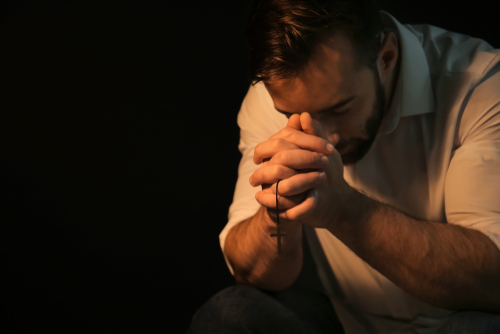
This is a question I had never considered but recently someone had asked and truthfully, I wasn’t well equipped to answer. Primarily because I didn’t have the academia or the need to validate why a priestly confession was important. Still as a Catholic, I recognize we are ambassadors of our faith and should know for those who question the necessity of a priest’s role for confession. In acknowledging this I decide to search for the answers and here’s what I found.
It’s important to acknowledge that Confession, better known as the Sacrament of Reconciliation, should be both a physical act and hopefully result in an internal transformation, but let’s first look at the internal transformation.
If a person simply shows up for Confession but does not have a repentant heart, then the sacrament does not constitute a full forgiveness. Sin continues to block the efficacy of the absolution to manifest the transformation from sinner to forgiven sinner.
St. Padre Pio, stigmatist and mystic received the gift of knowing a person’s sins before they came into the confessional. He was known for kicking people out of confessionals because he could see in their souls they were not internally remorseful. He could also tell when a person omitted a sin from their confession. His deep love and respect for Christ triggered such passion within, that when he recognized the lack of sincere remorse from the confessor it prompted an anger, which forced him to deny the sacrament until the confessor returned ready to genuinely repent.
Then I declared my sin to you; my guilt I did not hide. I said, “I confess my transgression to the LORD,” and you took away the guilt of my sin. Psalm 32:5
So why isn’t a contrite heart enough? There’s no debating God forgive sins to those with a repentant soul, but the reasons for a sacramental confession go much deeper

The bible tells us that an outward declaration of sin is also necessary. Passages throughout the bible, from the Old Testament, Gospels, to the Early Church address a physical confession is an integral part of our faith.
Confess your faults one to another, and pray for one another, that ye may be healed. The effectual fervent prayer of a righteous man availeth much. James 5:13
“Many of those who believed now came and openly confessed what they had done. (Acts 19:18)
There are Protestant groups who also acknowledge an outward declaration of one’s sins can be healing to the sinner, as well as giving counseling or guidance by a pastor or church elder. But unlike Catholics, this is only for the mental wellbeing of the sinner and not seen as necessary for forgiveness.
Even secular communities adopt Judeo- Christian philosophy of confession. In mental health groups the patient must go around and introduce who they are, what they do and why they are included in the group. This takes courage, this takes humility. This provides the catharsis necessary for true transformation to begin.
1458 Without being strictly necessary, confession of everyday faults (venial sins) is nevertheless strongly recommended by the Church.59 Indeed the regular confession of our venial sins helps us form our conscience, fight against evil tendencies, let ourselves be healed by Christ and progress in the life of the Spirit. By receiving more frequently through this sacrament the gift of the Father’s mercy, we are spurred to be merciful as he is merciful:60

Biblical references of authority go all the way back to the Old Testament. From the fall of Adam, God provides ways for his people to return to Him and offers internal and external atonements for one’s sins. The entire book of Leviticus (particularly Chapters 11-16) explicitly discuss ceremonial processes and sin offerings designated by God. This is done by both admission and atonement in order to keep in holiness with God.
And Aaron shall lay both his hands upon the head of the live goat, and confess over him all the iniquities of the children of Israel, and all their transgressions in all their sins, putting them upon the head of the goat, and shall send him away by the hand of a fit man into the wilderness. Leviticus 16:21
Keep in mind the Israelites offered many sacrifices for the atonements of their disobedience to God.In the New Testament we begin to see that confession is no longer sacrifice because Jesus becomes the sacrifice and prepares the way for the sacraments. Here John the Baptist, through God’s authority is preparing for what’s coming:
People of the whole Judean countryside and all the inhabitants of Jerusalem were going out to him and were being baptized by him in the Jordan River as they acknowledged their sins. Mark 1:5
But it isn’t until after Jesus’ death and resurrection he has redeemed sin through his death. It is here that Jesus gives two sacraments, that of Holy Orders and the authority to administer confession.
* And when He had said this, He breathed on them and said to them, “Receive the holy Spirit. Whose sins you forgive are forgiven them, and whose sins you retain are retained.” John 19:22-23
1444 In imparting to his apostles his own power to forgive sins the Lord also gives them the authority to reconcile sinners with the Church. This ecclesial dimension of their task is expressed most notably in Christ’s solemn words to Simon Peter: “I will give you the keys of the kingdom of heaven, and whatever you bind on earth shall be bound in heaven, and whatever you loose on earth shall be loosed in heaven.”45 “The office of binding and loosing which was given to Peter was also assigned to the college of the apostles united to its head.”46
 Further, it is evident Jesus gives the authority of the apostles to forgive sin, and he reinforces this both through the power of the Holy Spirit and through the sacrament of Holy Orders. The catechism further explains:
Further, it is evident Jesus gives the authority of the apostles to forgive sin, and he reinforces this both through the power of the Holy Spirit and through the sacrament of Holy Orders. The catechism further explains:
1461 Since Christ entrusted to his apostles the ministry of reconciliation,65 bishops who are their successors, and priests, the bishops’ collaborators, continue to exercise this ministry. Indeed bishops and priests, by virtue of the sacrament of Holy Orders, have the power to forgive all sins “in the name of the Father, and of the Son, and of the Holy Spirit.”
1465 When he celebrates the sacrament of Penance, the priest is fulfilling the ministry of the Good Shepherd who seeks the lost sheep, of the Good Samaritan who binds up wounds, of the Father who awaits the prodigal son and welcomes him on his return, and of the just and impartial judge whose judgment is both just and merciful. The priest is the sign and the instrument of God’s merciful love for the sinner.
Another way to understand the sacrament of confession applying the authority of a priest is to look at how the enemy responds to this act. And this is because the devil fears the Church. Fr. Joseph Maghinay, retired exorcist says, “the spiritual enemy trembles at the power of the Church as the Church is the Body of Christ.” In deliverance ministry confession of the ministry team and exorcist is one of the first acts required before any prayer or deliverance can take place, because the true goal of the ministry of exorcism is healing.
“If we confess our sins, he is faithful and just to forgive us our sins, and to cleanse us from all unrighteousness.” 1 John 1:9
It is I, I, who wipe out, for my own sake, your offenses; your sins I remember no more. Isaiah 43:25
By receiving the sacrament of confession for those involved in the ministry, the priest has removed all stain of sin confessed. When our sins are forgiven they are never remembered and the enemy cannot use them against us. Vatican trained Exorcist Fr. Vincent Lampert has said that “one good confession can be more powerful than an exorcism,” implying that the struggles within can attract the enemy and when we confess our wrongdoings, the devil’s hold on us is lifted.
“Whoever confesses his sins…is already working with God. “ God indicts your sins; if you also indict the you are joined with God. Man and sinner are, so to speak two realities.: when you hear “man- this is what God has made; when you hear “sinner-this is what man himself has made. Destroy what you have made, so that God may save what he has made….When you abhor what you have made, it is then that your good works are beginning. Since you are accusing yourself of evil works. The beginning of good works is the confession of evil works. You do the truth and come to the light.” St.Augustine.
 “Daughter, when you go to confession, to this fountain of My mercy, the Blood and Water which came forth from My Heart always flows down upon your soul and ennobles it. Every time you go to confession, immerse yourself in My mercy, with great trust, so that I may pour the bounty of My grace upon your soul. When you approach the confessional, know this, that I Myself am waiting there for you. I am only hidden by the priest, but I Myself act in your soul. Here the misery of the soul meets the God of mercy. Tell souls that from this fount of mercy souls draw graces solely with the vessel of trust. If their trust is great, there is no limit to My generosity.” St. Faustina- Divine Mercy in My Soul
“Daughter, when you go to confession, to this fountain of My mercy, the Blood and Water which came forth from My Heart always flows down upon your soul and ennobles it. Every time you go to confession, immerse yourself in My mercy, with great trust, so that I may pour the bounty of My grace upon your soul. When you approach the confessional, know this, that I Myself am waiting there for you. I am only hidden by the priest, but I Myself act in your soul. Here the misery of the soul meets the God of mercy. Tell souls that from this fount of mercy souls draw graces solely with the vessel of trust. If their trust is great, there is no limit to My generosity.” St. Faustina- Divine Mercy in My Soul
“Go to your confessor; open your heart to him; display to him all the recesses of your soul; take the advice that he will give you with the utmost humility and simplicity. For God, Who has an infinite love for obedience, frequently renders profitable the counsels we take from others, but especially from those who are the guides of our souls.”- St. Francis de Sales
Finally, we confess to a priest to face our own shame. When confessing to God silently we are forgiven, but to remain hidden, that in itself is sin which is pride. What sin allows us to do, is to distort our lives for the holiness that it can be. Priests often hear that the reason people won’t go to confession is they are worried about being judged. The role of the priest is not to judge, but rather to love and to pour out Jesus’ love. The reminder is that through the physical presence of the priest, the repentant makes a physical act and sits in front of the authority of Jesus. Even if a priest might be stoic or show little compassion, his presence confirms the presence of Jesus.

Secondly, that feeling of shame may not be comfortable but physically confessing provides a release. There’s something about expressing one’s sins through the breath that has significance. It has to come from your diaphragm. It has to come from the Holy Spirit. Someone who is in the Spirit and someone who is reading the word, that is when the confession truly takes place.
1456 Confession to a priest is an essential part of the sacrament of Penance: “All mortal sins of which penitents after a diligent self-examination are conscious must be recounted by them in confession, even if they are most secret and have been committed against the last two precepts of the Decalogue; for these sins sometimes wound the soul more grievously and are more dangerous than those which are committed openly.”54
Lastly, asking for forgiveness rather than admitting your sorry, represents the depth of our own sorrow for what we have done to cause damage, harm, etc. When we ask for forgiveness in the sacrament of confession we acknowledge our need, our lack, our humanness. By seeking forgiveness, we gain humility.
Have mercy on me, God, in accord with your merciful love; in your abundant compassion blot out my transgressions. Thoroughly wash away my guilt; and from my sin cleanse me. Psalm 51:3-4








One Response
Absolutely fantastic article. Thank you for sharing.